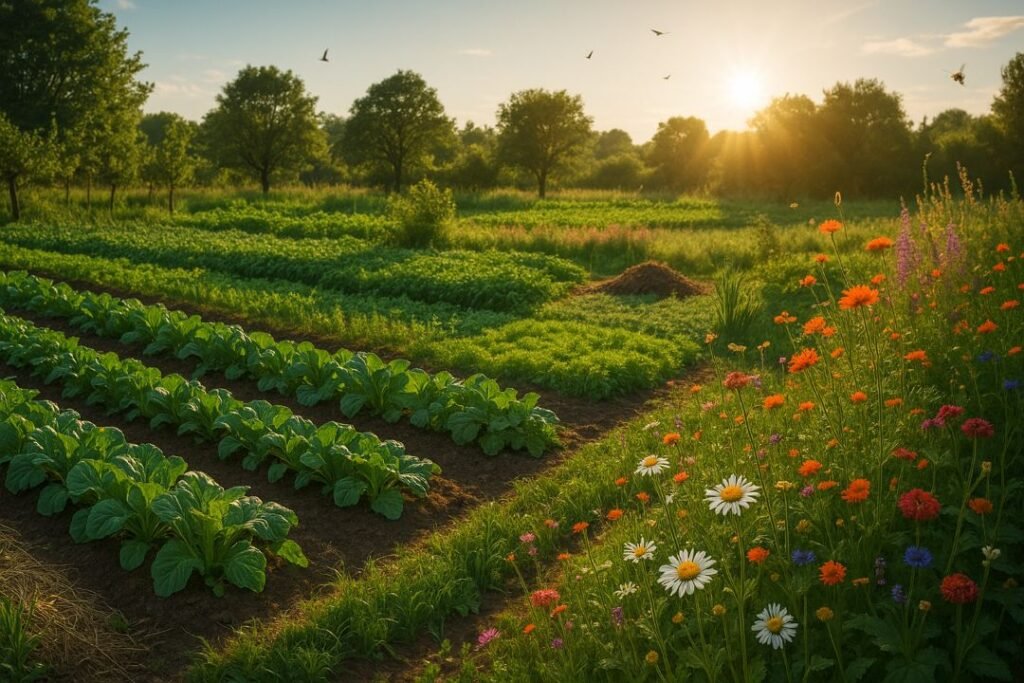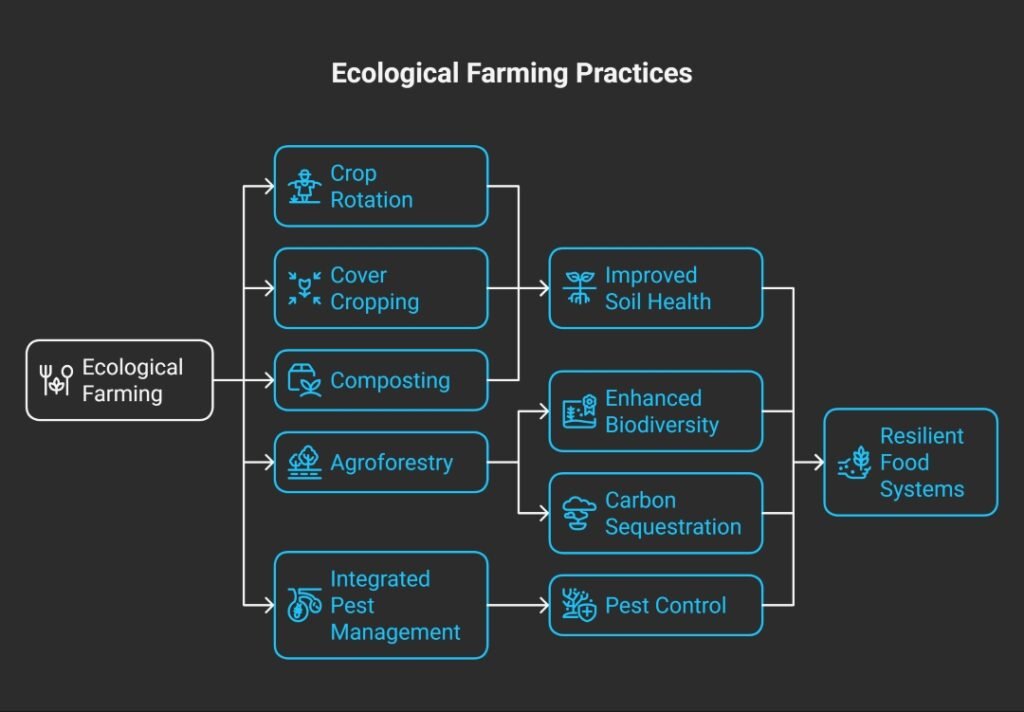Why Ecological Farming Matters: Building a Sustainable Agricultural Future

As climate change accelerates, biodiversity dwindles, and soil degradation threatens food security, ecological farming emerges as a beacon of hope for sustainable agriculture. Unlike conventional methods that often deplete natural resources, ecological farming prioritizes harmony with nature, fostering resilient ecosystems and healthier food systems. This blog explores why ecological farming is gaining global attention, offering a regenerative alternative to extractive agricultural models. Let’s dive into its principles, benefits, and real-world impact to understand why it’s critical for our planet’s future.
Understanding Ecological Farming
What is Ecological Farming?
Ecological farming is an agricultural approach that works with natural systems to produce food sustainably. Rooted in principles of environmental stewardship, it minimizes synthetic inputs like chemical fertilizers and pesticides, favoring closed-loop systems that recycle nutrients and resources. According to the Food and Agriculture Organization (FAO), ecological farming aligns with agroecology, emphasizing biodiversity, soil health, and ecosystem balance (FAO, Agroecology Knowledge Hub).
Core Principles
- Harmony with Nature: Mimicking natural ecosystems to enhance resilience.
- Minimal External Inputs: Reducing reliance on synthetic chemicals and non-renewable resources.
- Closed-Loop Systems: Recycling organic matter to maintain soil fertility and reduce waste.
Comparison with Conventional Farming
Unlike conventional farming, which often relies on monocultures and heavy chemical use, ecological farming integrates diverse crops and natural pest control. While conventional methods prioritize short-term yields, ecological approaches focus on long-term sustainability, reducing environmental harm and improving ecosystem health.
The Urgent Need for Ecological Farming Today
Industrial agriculture contributes significantly to environmental degradation, including 24% of global greenhouse gas emissions from agriculture and land use (IPCC, 2019). Soil degradation affects 33% of global land, threatening food production (FAO, 2015). Additionally, pesticide overuse has been linked to declining pollinator populations, with a 30-50% drop in bee colonies in some regions (Greenpeace, 2021).
Ecological farming addresses these issues by restoring ecosystems, improving food quality, and meeting the growing consumer demand for sustainable products. A 2023 survey by Statista found that 60% of U.S. consumers prefer sustainably produced food, highlighting the shift toward ethical consumption (Statista, 2023).
How Ecological Farming Works in Practice

Ecological farming employs diverse techniques to enhance sustainability:
- Crop Rotation: Alternating crops to improve soil health and reduce pests.
- Cover Cropping: Planting cover crops like clover to prevent erosion and enrich soil.
- Composting: Recycling organic waste to create nutrient-rich fertilizers.
- Agroforestry: Integrating trees with crops to enhance biodiversity and sequester carbon.
- Integrated Pest Management (IPM): Using natural predators and barriers to control pests.
By blending traditional knowledge with modern science, ecological farming leverages local resources to create resilient food systems. For instance, Indigenous practices like intercropping are often combined with data-driven soil management to optimize yields.
Key Benefits of Ecological Farming
a. Healthier Soils and Long-Term Fertility
Ecological farming builds soil organic matter, with studies showing a 20-40% increase in soil carbon stocks compared to conventional methods (Rodale Institute, 2020). Healthy soils retain nutrients longer, ensuring sustained productivity.
b. Enhanced Biodiversity and Ecosystem Restoration
By fostering diverse crops and habitats, ecological farming supports pollinators and wildlife. A 2019 study found that organic farms host 50% more species than conventional farms (University of Oxford, 2019).
c. Water Conservation and Climate Adaptation
Techniques like mulching and cover cropping reduce water runoff by up to 35%, conserving water in drought-prone areas (USDA, 2022). Ecological farms are also more resilient to climate extremes, with diversified systems better equipped to withstand floods and droughts.
d. Improved Food Quality and Nutritional Value
Ecologically grown produce often contains higher levels of antioxidants and micronutrients. A 2014 meta-analysis found that organic crops have 17% higher antioxidant levels than conventional ones (British Journal of Nutrition, 2014).
e. Economic Viability and Farmer Empowerment
Ecological farming reduces input costs by minimizing reliance on expensive chemicals. A 2021 report by the Organic Trade Association noted that organic farms in the U.S. saw a 20% increase in net income compared to conventional farms (OTA, 2021).
Ecological vs. Conventional Farming: A Clear Comparison
| Aspect | Ecological Farming | Conventional Farming |
|---|---|---|
| Input Types | Natural (compost, biofertilizers) | Synthetic (chemical fertilizers, pesticides) |
| Environmental Impact | Low; enhances biodiversity, soil health | High; contributes to pollution, soil depletion |
| Economic Impact | Lower input costs, premium pricing | High input costs, volatile markets |
| Yield Stability | Resilient to climate shocks | Vulnerable to extreme weather |
| Sustainability | Long-term, regenerative | Short-term, extractive |
Ecological Farming in Action: Global Examples
North America: Polyface Farms, Virginia
Polyface Farms uses rotational grazing and diversified crops to produce organic vegetables and pasture-raised meat. Their model has increased soil fertility by 8% annually and reduced input costs by 30% (Polyface Farms, 2023).
Europe: La Ferme du Bec Hellouin, France
This regenerative farm combines permaculture and agroforestry, achieving yields comparable to conventional farms while restoring local ecosystems. It serves as a model for European cooperatives (La Ferme du Bec Hellouin, 2024).
UK and Canada: Emerging Movements
In the UK, the Soil Association promotes ecological farming through certifications and training, with a 12% rise in organic farmland since 2020 (Soil Association, 2023). In Canada, programs like ALUS support farmers transitioning to regenerative practices, impacting over 1.2 million acres (ALUS, 2024).
Policy Support and Market Trends
Governments are increasingly incentivizing ecological farming. The EU’s Farm to Fork Strategy aims for 25% of agricultural land to be organic by 2030 (European Commission, 2020). In the U.S., the USDA’s Conservation Stewardship Program supports eco-friendly practices, benefiting 70 million acres (USDA, 2023).
The organic food market is projected to reach $532 billion globally by 2027, driven by consumer demand for eco-labeled products (Statista, 2023). International frameworks like the UN’s Sustainable Development Goals further emphasize ecological farming’s role in food security.
Challenges and the Path Forward
Despite its benefits, ecological farming faces barriers:
- Knowledge Gaps: Farmers need training to adopt new techniques.
- Market Access: Small-scale farmers struggle to compete with industrial producers.
- Transition Costs: Initial investments can deter adoption.
Solutions include:
- Farmer Training: Programs like those offered by the Rodale Institute.
- Policy Reforms: Subsidies for ecological practices over chemical inputs.
- Public Awareness: Campaigns to educate consumers on sustainable choices.
Collaboration between farmers, consumers, and governments can scale ecological farming’s impact, ensuring food security and environmental health.
How You Can Support the Movement
- Conscious Purchasing: Choose organic or eco-labeled products at grocery stores.
- Support Local Farmers: Buy from farmers’ markets or ecological farms.
- Join a CSA: Participate in community-supported agriculture for fresh, sustainable produce.
- Grow Your Own: Start a small garden using ecological principles like composting and crop rotation.
Conclusion
Ecological farming is not just a trend—it’s a necessity for a sustainable future. By prioritizing soil health, biodiversity, and resilience, it addresses the pressing challenges of climate change and food security. Embrace ecological farming by supporting local farmers, advocating for policy changes, and making informed food choices. For more resources, explore Agro Reality’s guides and training programs (Agro Reality).
FAQ
What’s the difference between ecological and organic farming?
Ecological farming encompasses organic practices but emphasizes broader ecosystem restoration and closed-loop systems. Organic farming focuses on avoiding synthetic inputs.
Is ecological farming economically viable?
Yes, reduced input costs and premium pricing for eco-labeled products make it profitable, with organic farms often outperforming conventional ones (OTA, 2021).
Can ecological farming feed the global population?
Studies suggest ecological farming can meet global food demands through diversified systems and improved soil fertility, though scaling requires investment and policy support (FAO, 2017).
To learn more about securing financial support for sustainable agriculture, check out our detailed guide on How to Get Government Grants for Organic Farming in the USA.